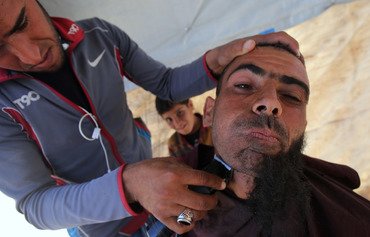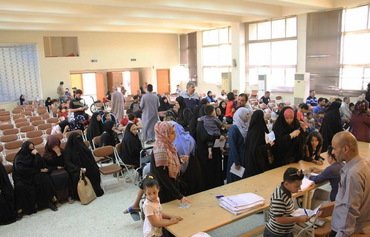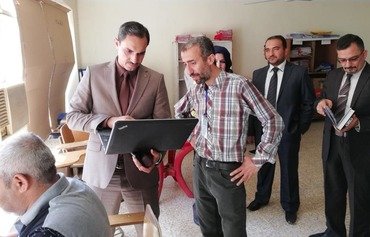Around two million low-income Iraqi families are set to receive emergency cash payments as part of a government programme to assist those who are struggling as a result of the novel coronavirus (COVID-19) lockdown.
Per the Ministry of Planning's recommendation, the government will provide emergency cash payments to families who cannot make ends meet as a result of the curfew in place to curb the spread of the virus.
The Higher Committee for National Health and Safety on April 7th allocated 600 billion Iraqi dinars ($500,000) to be distributed to struggling families under an emergency stimulus programme.
"The payments will be paid out in two monthly installments for qualifying families -- an estimated two million in total," ministry spokesman Abdul Zahra al-Hindawi told Diyaruna.
![Food baskets are prepared on April 15th to be distributed to low-income families. [Photo courtesy of the Iraqi Ministry of Labour]](/cnmi_di/images/2020/04/29/23770-iraq-virus-aid-600_384.jpg)
Food baskets are prepared on April 15th to be distributed to low-income families. [Photo courtesy of the Iraqi Ministry of Labour]
Ensuring transparency
Online applications were accepted through the Higher Committee for National Health and Safety's website for five days in mid-April, al-Hindawi said.
In total, 2.7 million families (or nearly 13 million individuals) applied, he said, adding that the emergency support programme will disperse funds to these families after ensuring the applicants are eligible to receive it.
"We have put in place an easy mechanism to give out the stimulus payments," he said.
All approved applicants need to only visit the nearest banking centre, he explained, where they can receive their stimulus payment after presenting their unique code and verifying their identity.
Each qualifying family will be given 300,000 Iraqi dinars ($250) over two consecutive months.
Families who have a member who is a government employee or receives payments from the government in some form are not eligible to receive the payments, senior Deputy Minister of Labour Falih al-Ameri told Diyaruna.
The programme aims to reach families subsisting on daily wages from the private sector whose livelihoods have been affected by the lockdown, he said.
In order to prevent fraud, applicants' information has been analysed by teams from the Information Technology Centre under supervision from specialised government committees, al-Ameri said.
These committees have audited all the applicant data and cross-referenced it with government-supplied data in order to ensure a just distribution of funds, he added.
Supporting families
The stimulus programme is one of several government measures to support Iraqis who have been adversely affected by the global pandemic.
These measures include "cancelling interest on loans given to farmers and other individuals as well as forgiving their debt or giving them a payment holiday on their debt to the government", al-Ameri said.
They also include "a payment holiday for water and electricity bills and other utilities, as well as the provision of essential food items and tax free food imports", he added.
Economist Saleh al-Hammash told Diyaruna he welcomed the government's provision of support to poor families.
But these measures came "somewhat late, as preparations should have happened earlier and started a month before the lockdown", he said.
More people need to benefit from the stimulus programme, he noted, as "the national poverty rate is 20%".
Al-Hammash also called for a government emergency plan that accounts for the possibility of a prolonged lockdown, given the implications this might have on the economy and impoverished Iraqis.
"The stimulus [payments] reduce some of the burden on us, but is not enough to meet all our living needs," said Baghdad taxi driver Hussein Abed Zaid.
"We hope this crisis will pass and we can go back to work," he told Diyaruna.

![Iraqi government employees attend a training session on April 19th on verifying applicants for the national coronavirus stimulus programme. [Photo courtesy of the Iraqi Social Protection Authority]](/cnmi_di/images/2020/04/29/23769-iraq-virus-session-600_384.jpg)







Can I know why I haven't received the grant?
Reply3 Comment(s)
Peace be upon you! The assistance hasn't been distributed by Asiacell, although Korek has already distributed it. Please check with Asiacell.
Reply3 Comment(s)
Peace be upon you! I’m from Mosul, Iraq. Hope you can kindly help us. We don’t have a home, a job or a salary. Hope you can help us as soon as possible.
Reply3 Comment(s)